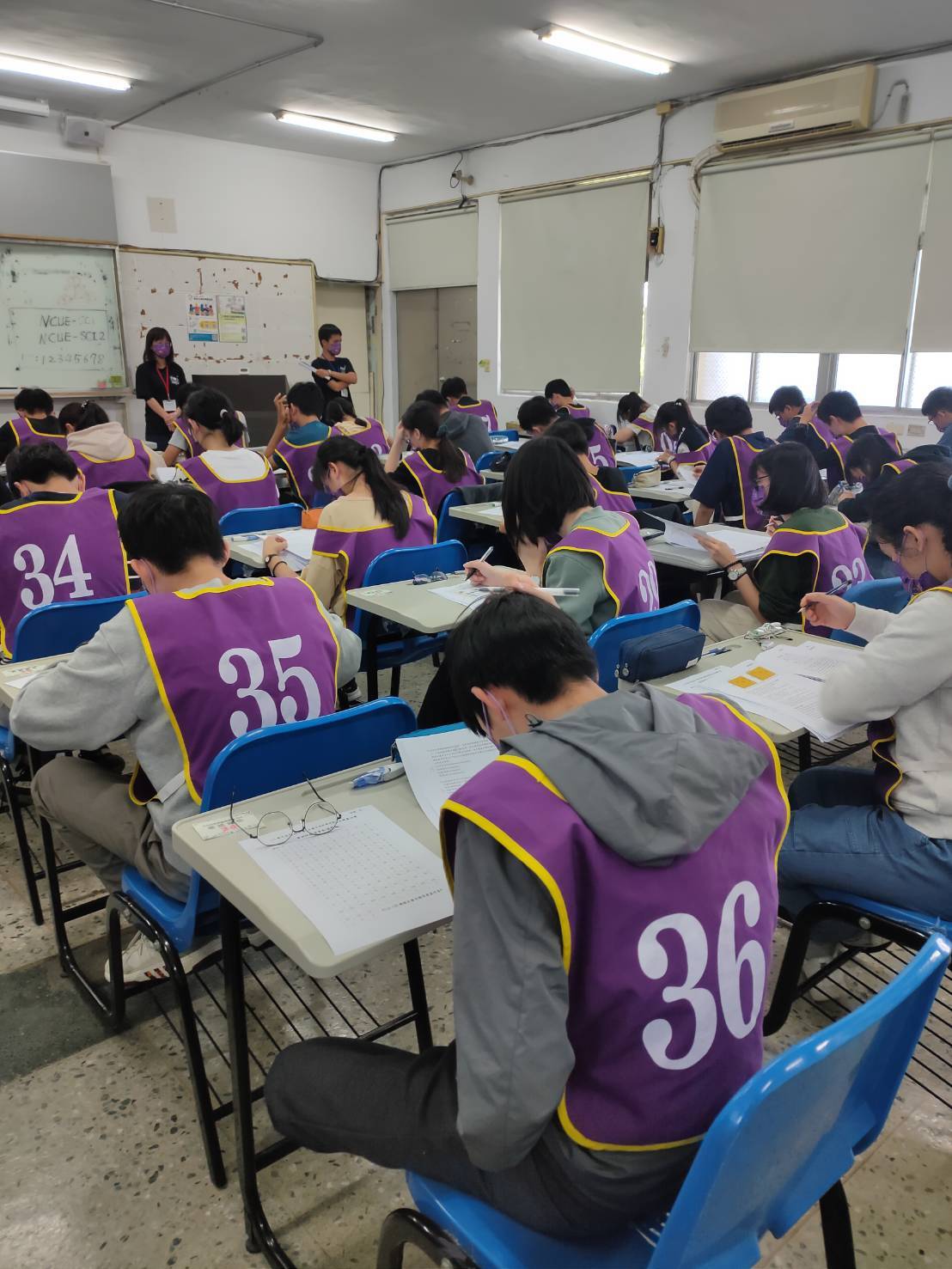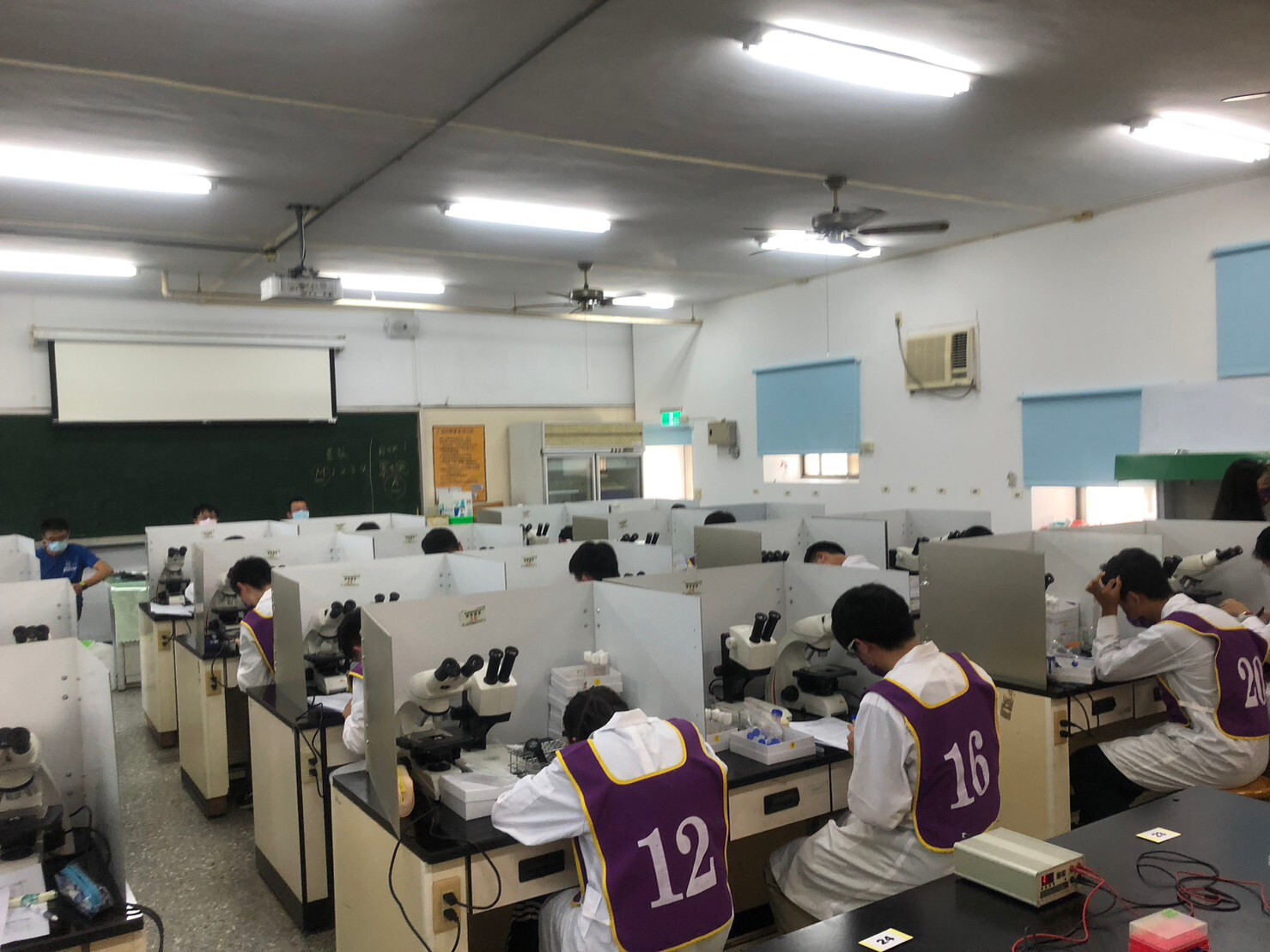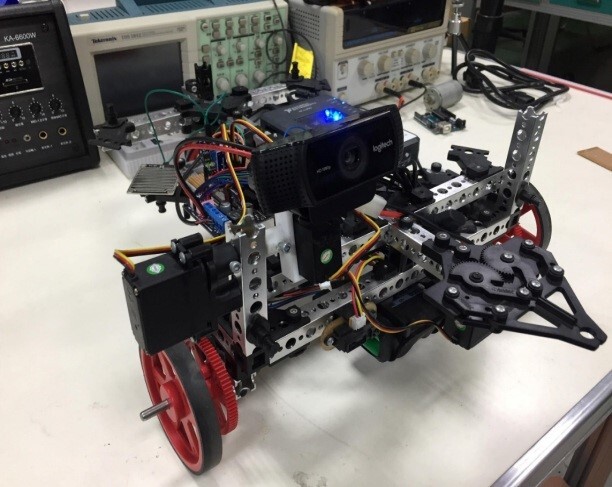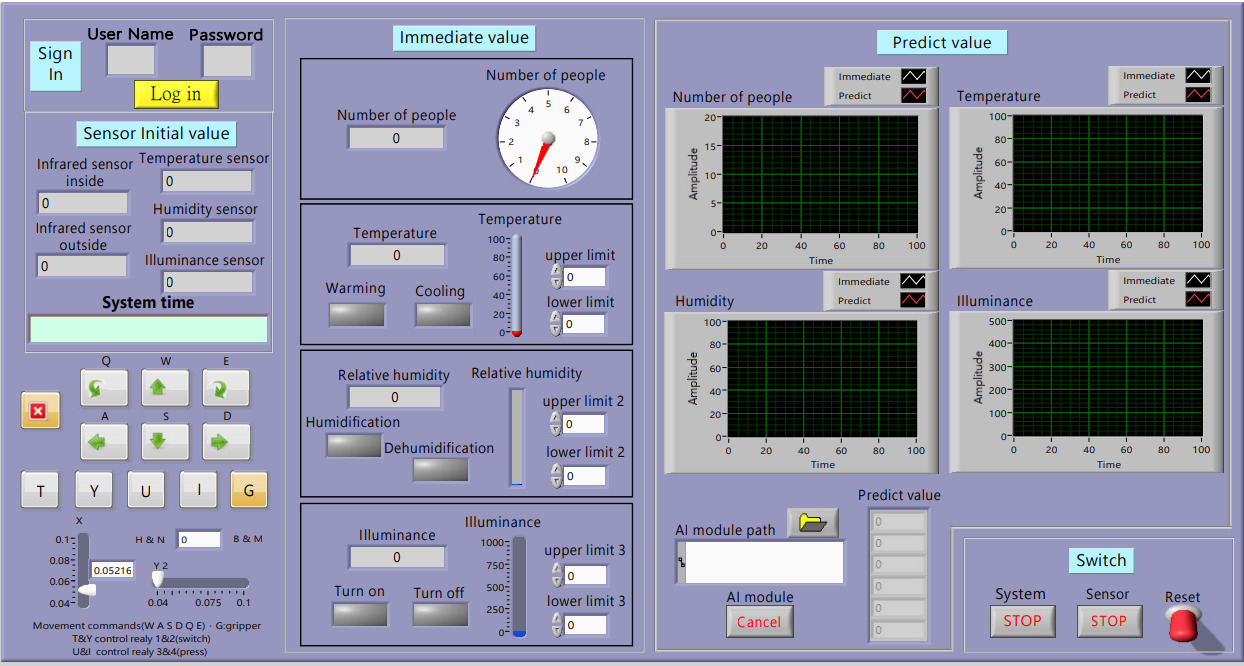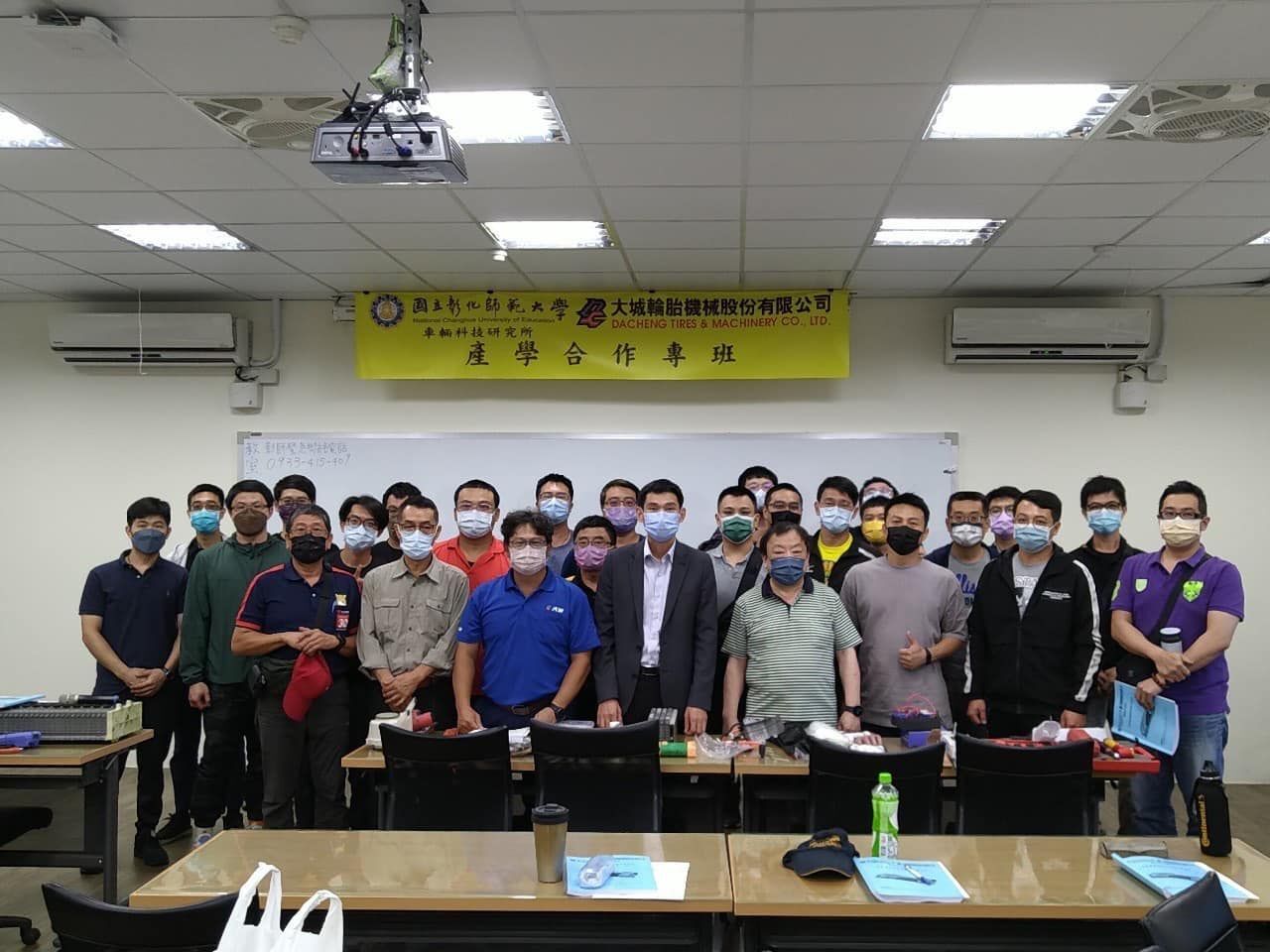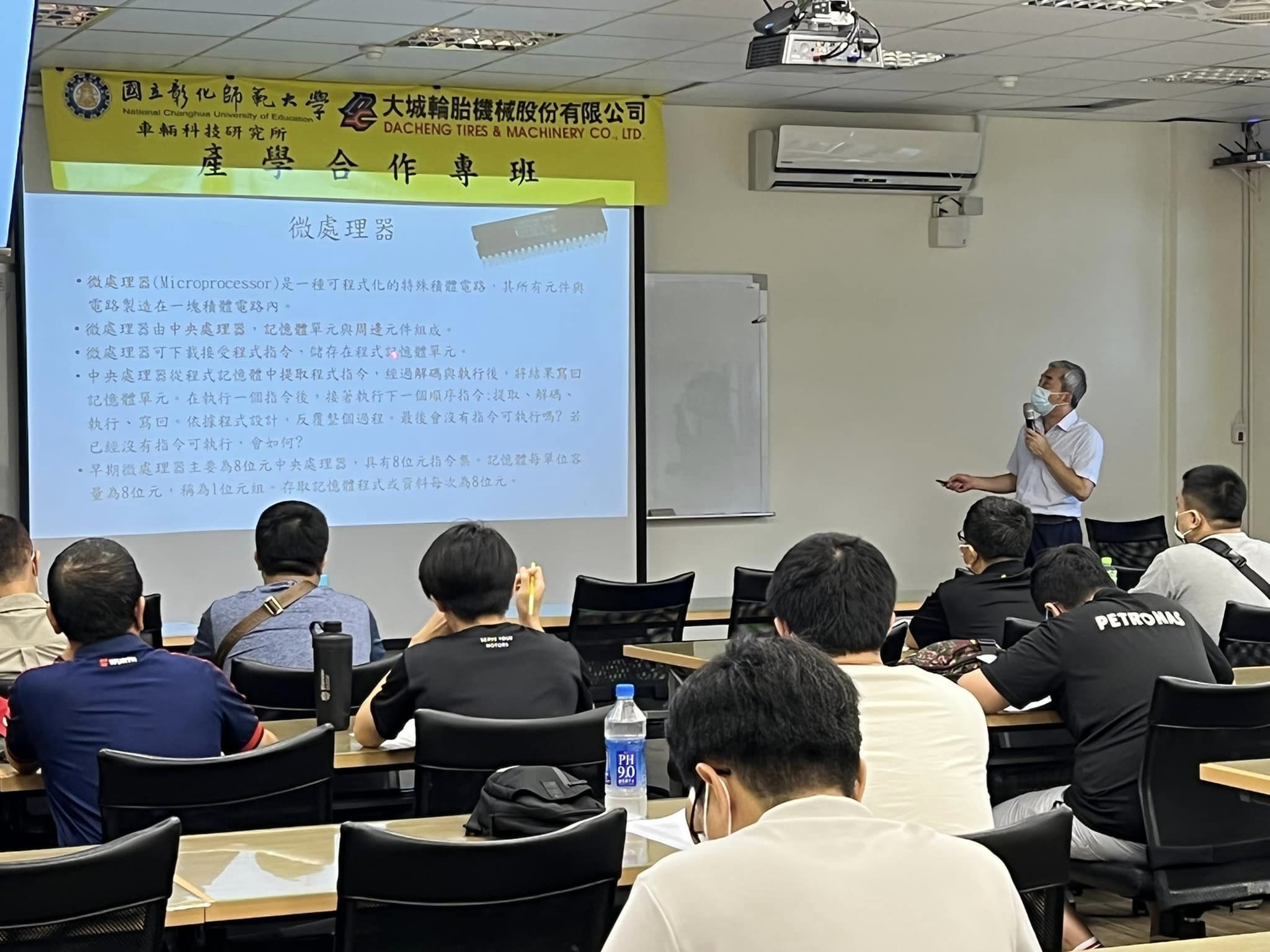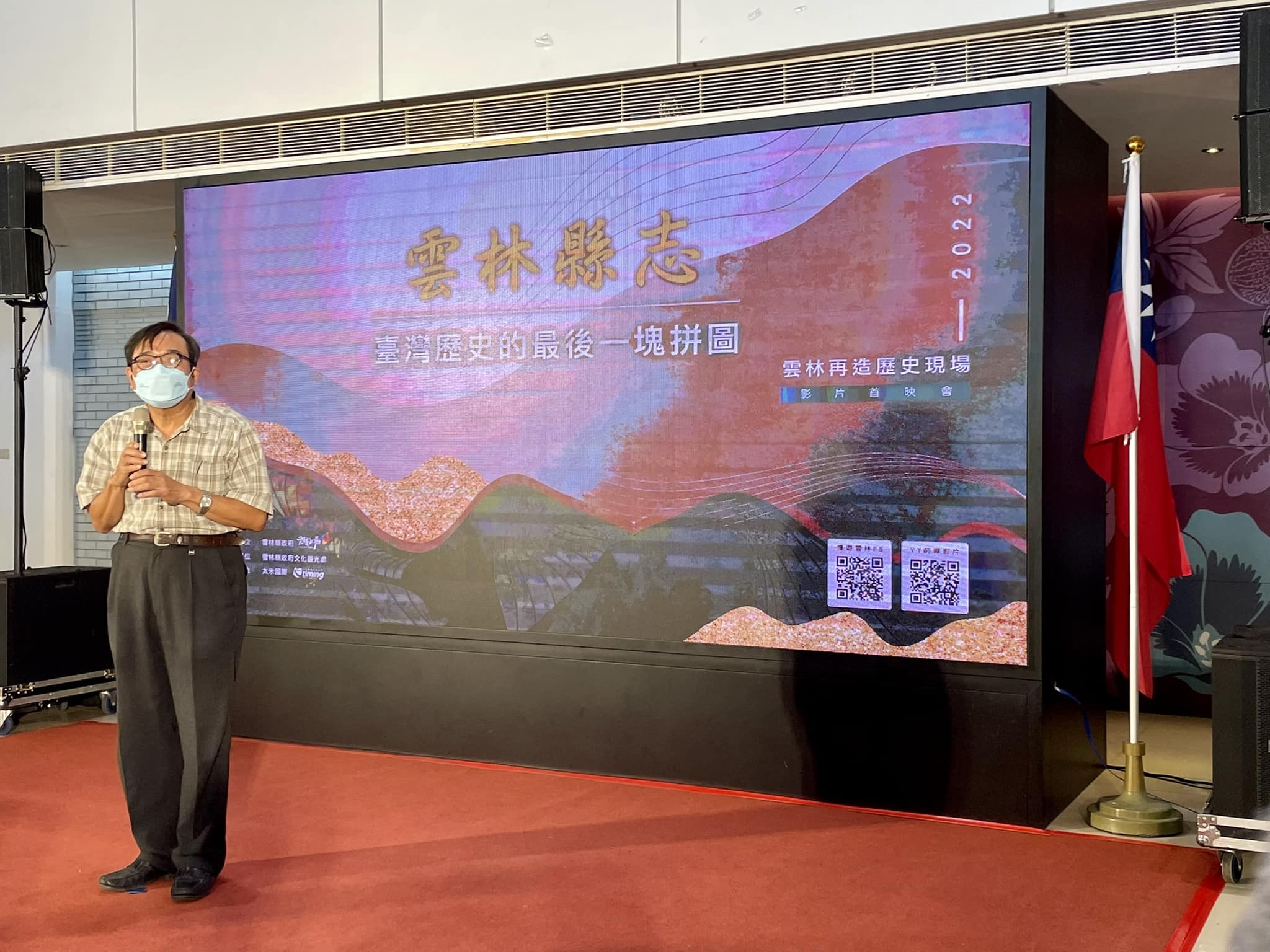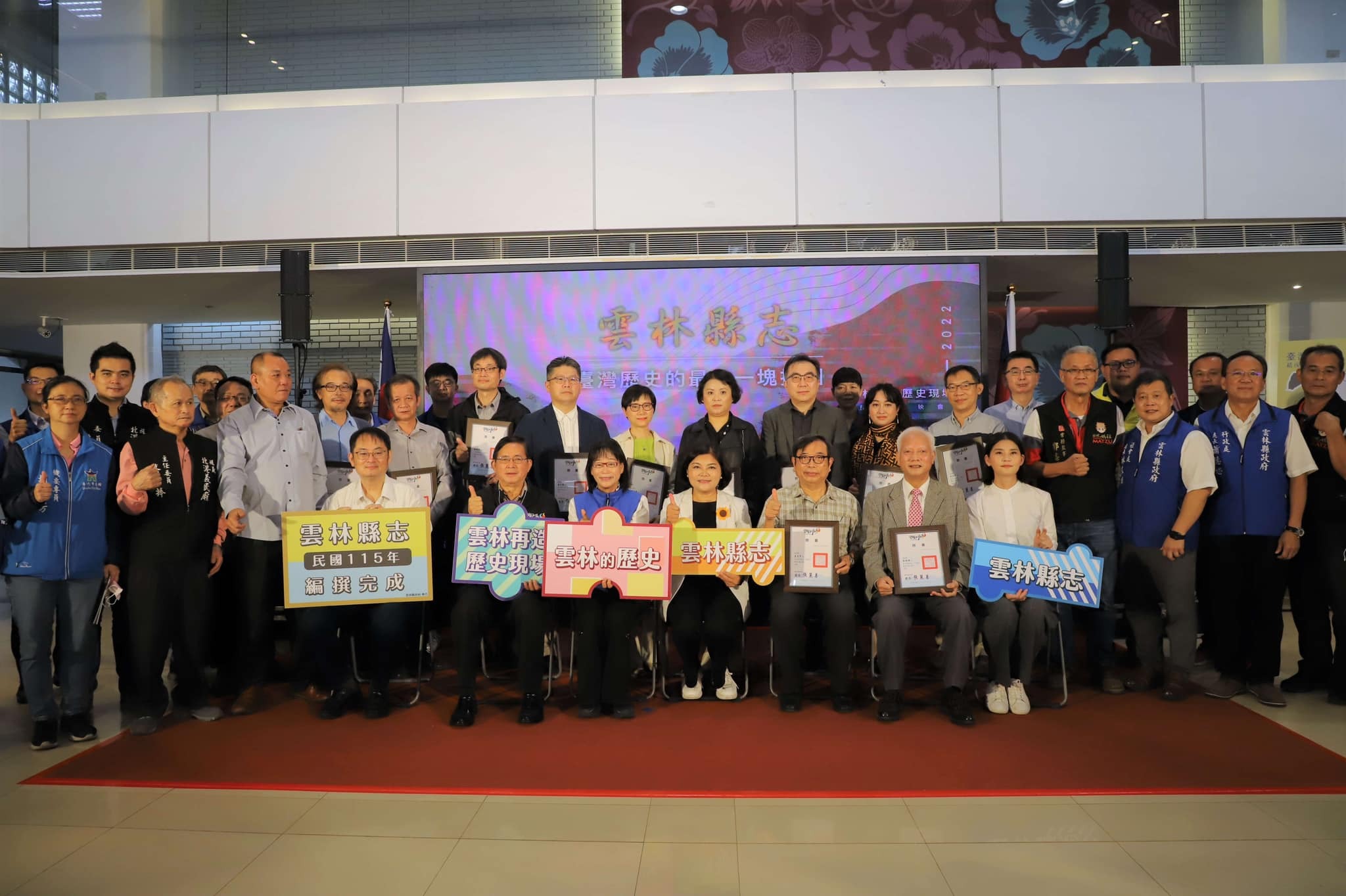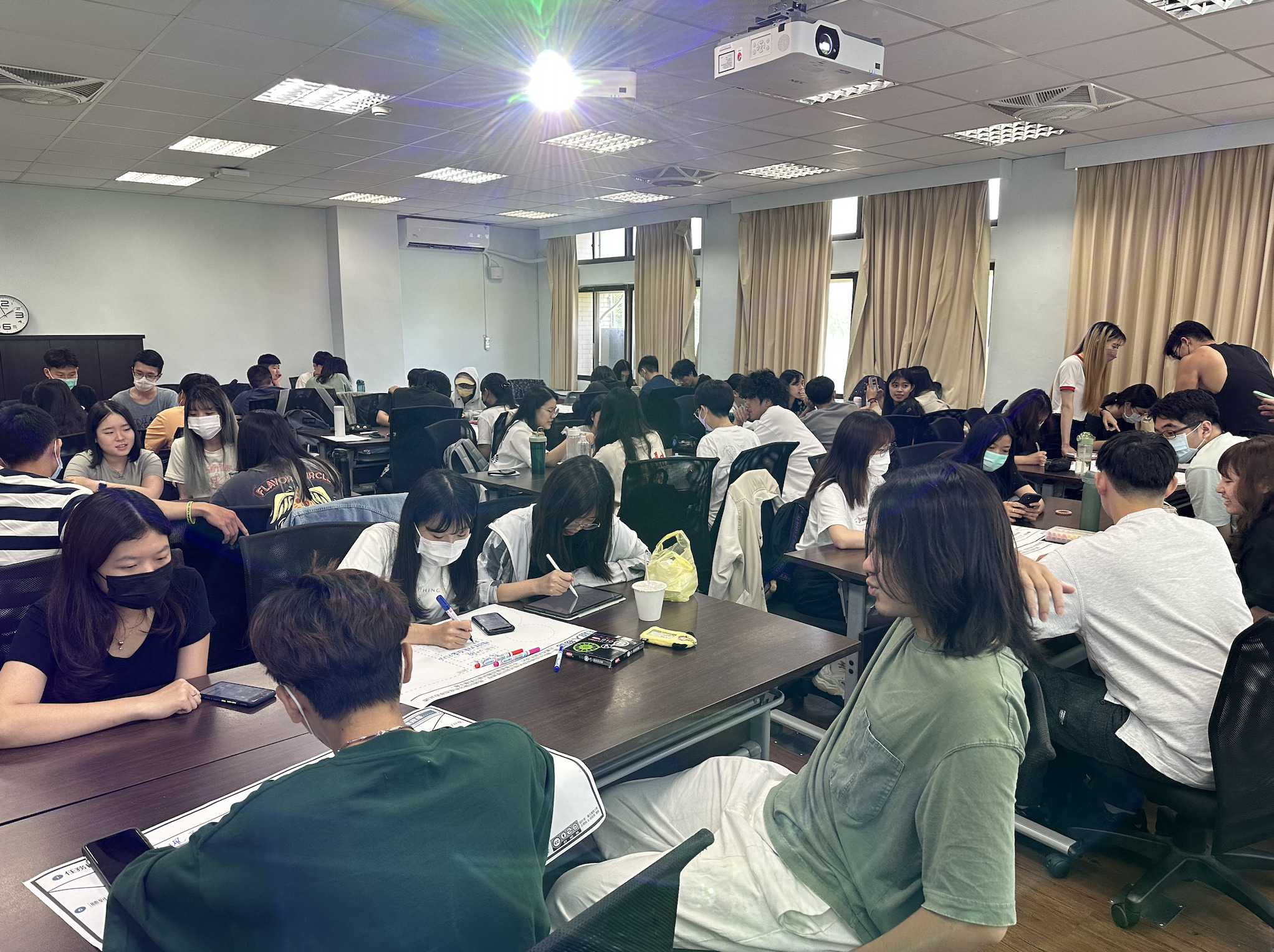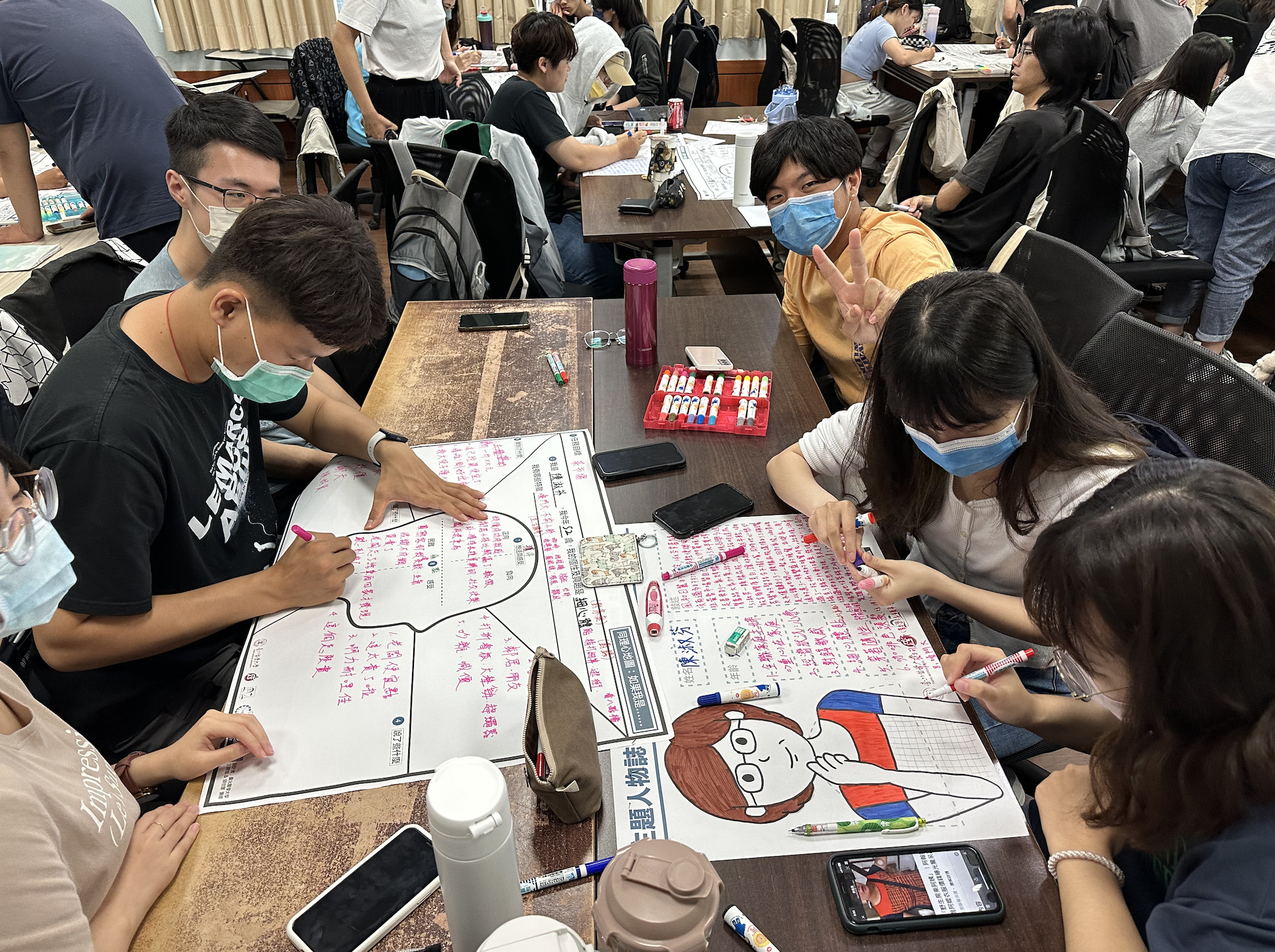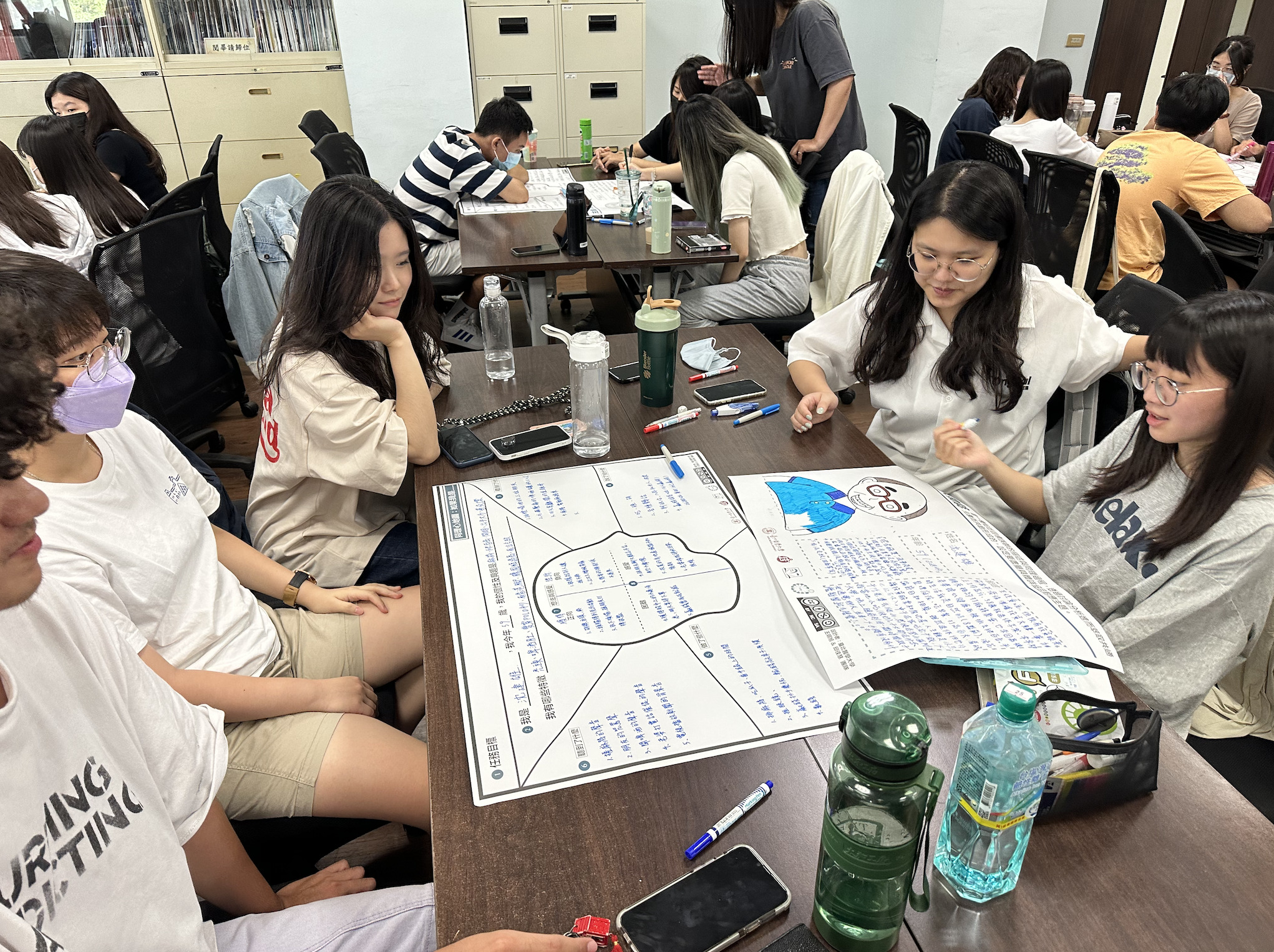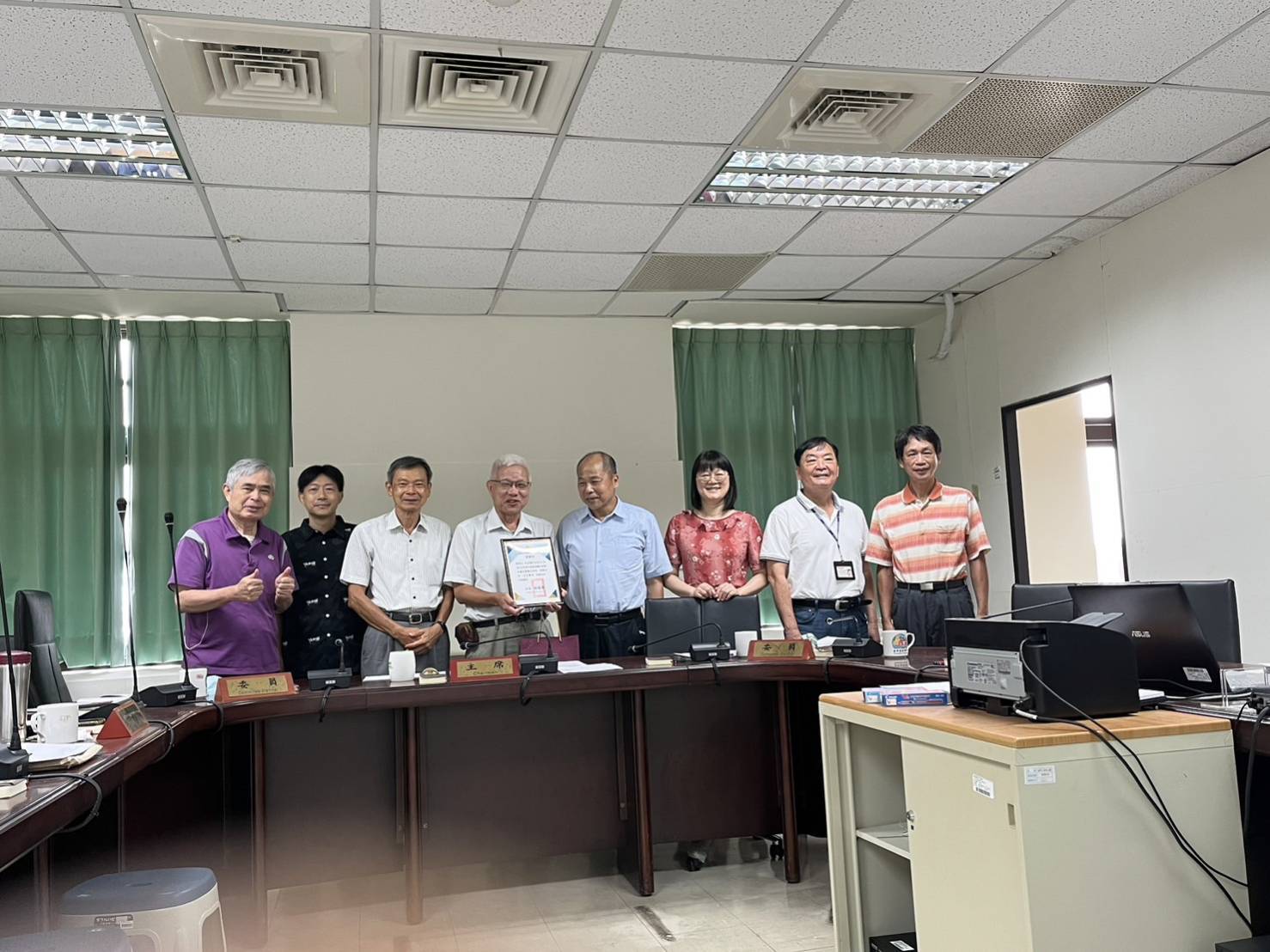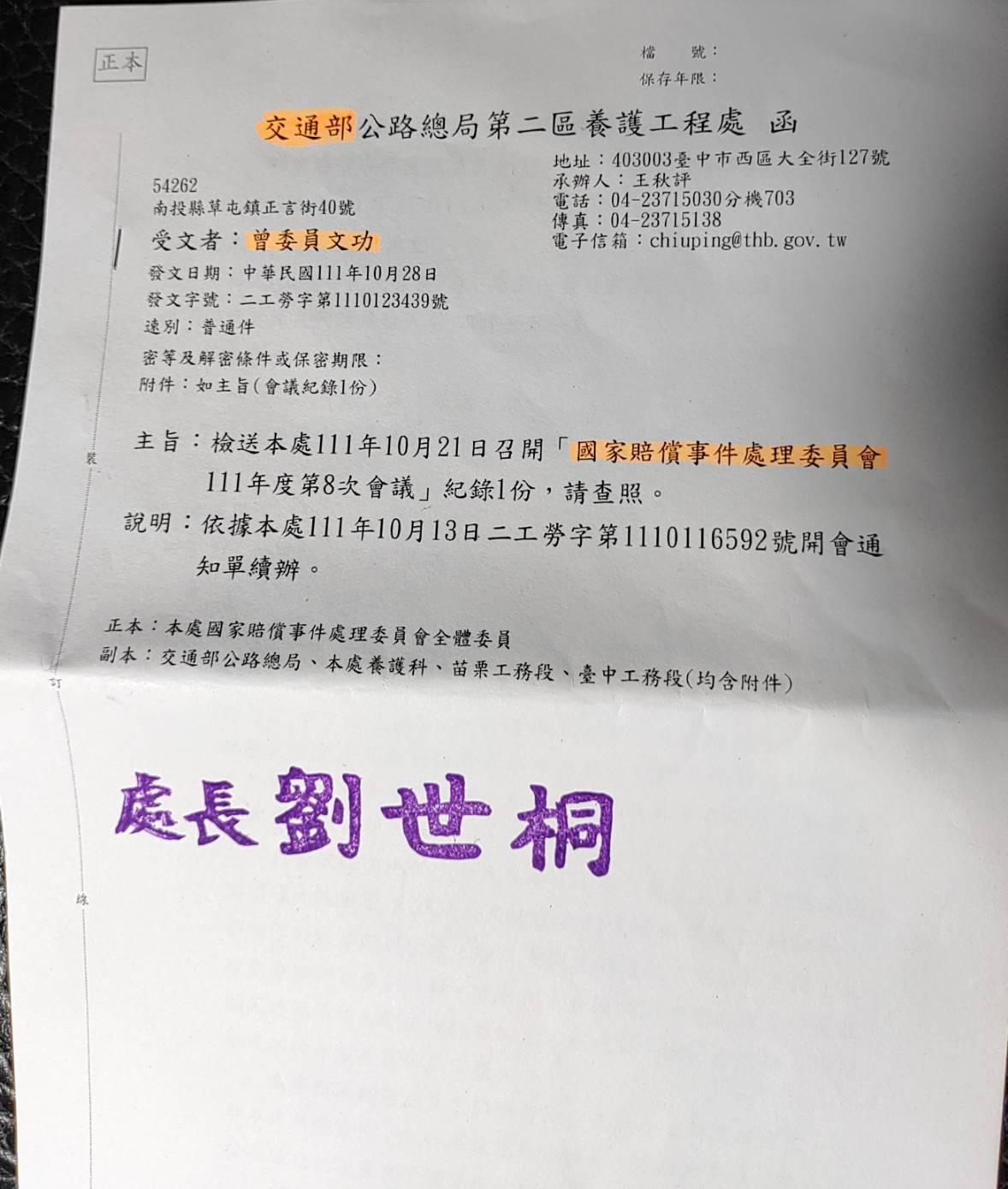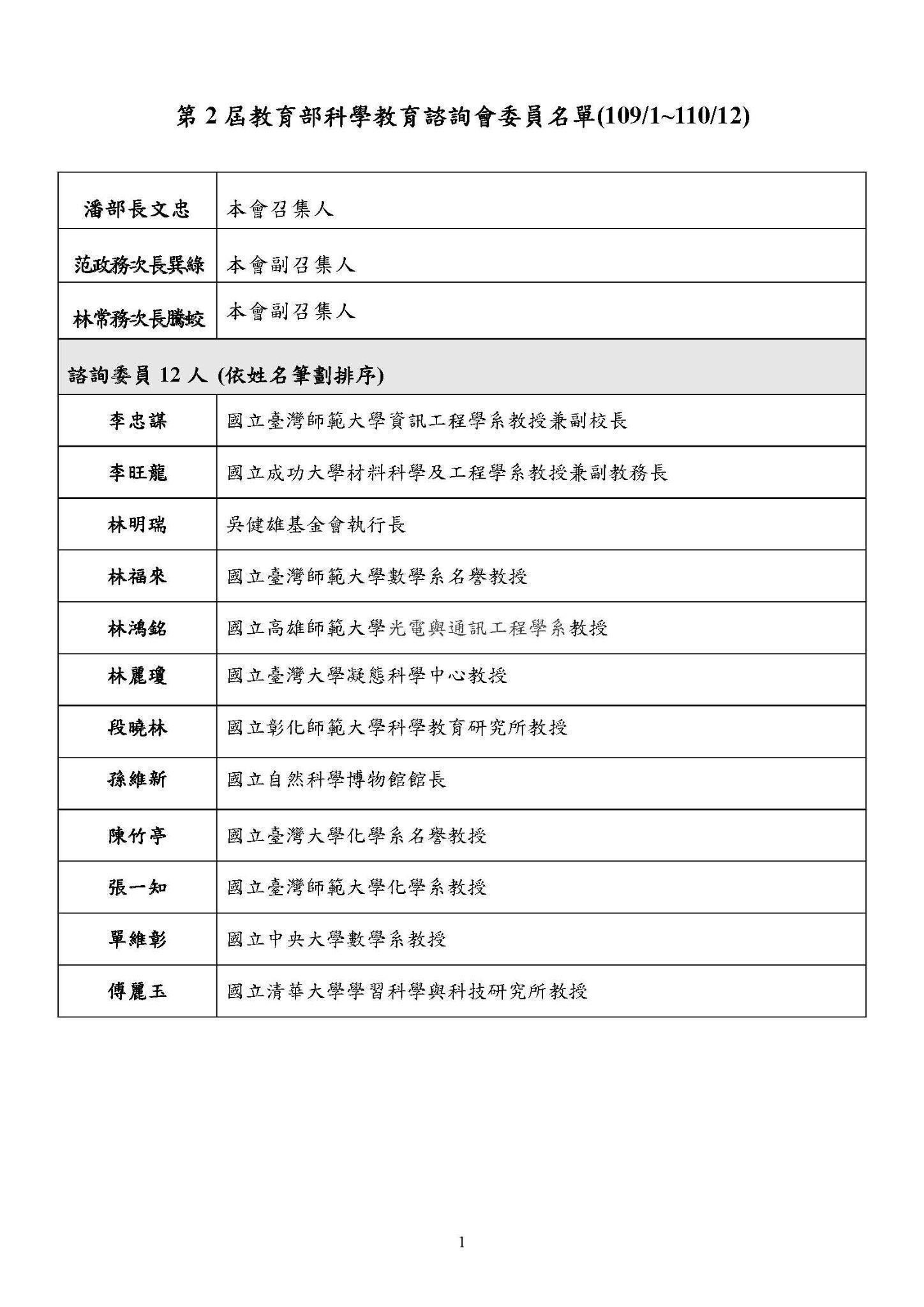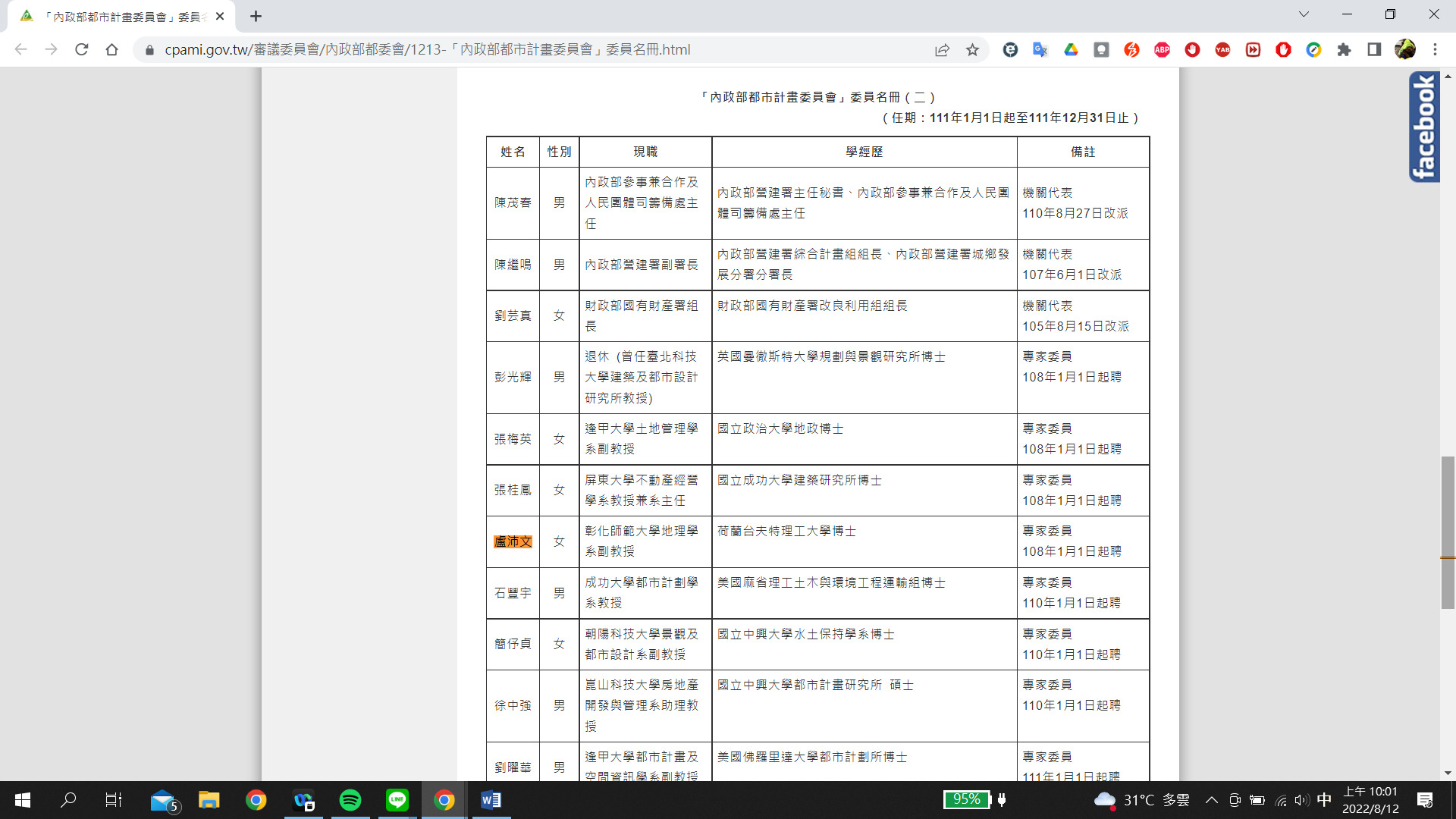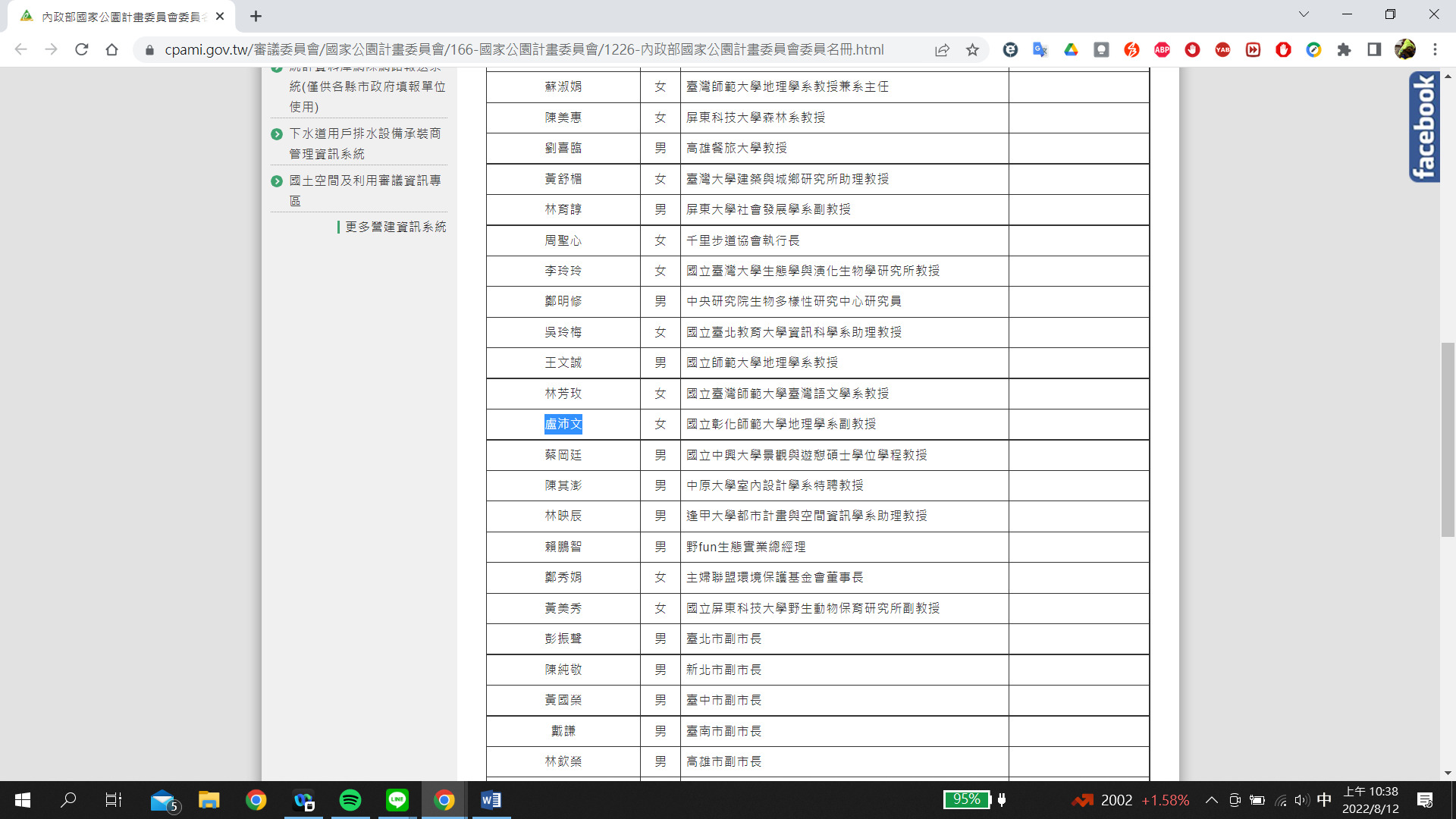SDG 17.2.1 Relationships with regional NGOs and government for SDG policy
NCUE actively participates in the promotion of sustainable development goals and policies by non-governmental organizations and the government. Faculty members in the school directly participate in or engage themselves with the national government’s policy formulation of sustainable development goals by carrying out government or non-governmental projects and serving as committee members of relevant units. Last year, the University selected 9 cases of faculty members undertaking government projects and serving as committee members of government units. In 2022, we present 15 cases of faculty members undertaking government projects and 10 cases of faculty members serving as committee members of government units, which are further detailed below:
1. Assistant Professor Shu-Hua Lin of the Department of Guidance and Counseling of National Changhua University of Education carried out “The Construction of School Counselors’ Advocacy Competencies Model and Infused into Pre-Service Teacher Education Courses: An Action Research of Social Justice Ethical Practice” of the National Science and Technology Counci. The advocacy of social justice is the core value and philosophy of current school counseling work. This study aims to explore the experience of school counselors in advocating practical actions, and understand the content of experience from advocating practical actions through grounded theory research methods. The supporting information is detailed in Annex 17.2.1A.
SDGs relevance: Quality Education; Reduced Inequalities; Peace, Justice and Strong Institutions
2. Professor Chiu-Lan Hsieh of the Department of Biology served as the principal investigator of the Ministry of Education’s “2022 Academic Year General Senior High School Mathematics and Information Courses Abilities Competition - Biology Finals” to enhance the teaching of biology subjects in public and private senior high schools and improve students’ interest in the study of life sciences, further encouraging the interactions between students and schools and improving the quality of science education. Please refer to Figure1 below for the event photos.
|
|
|
|
|
|
|
Figure 1. 2022 Academic Year General Senior High School Mathematics and Information Courses Abilities Competition - Biology Finals |
|
SDGs relevance: Quality Education
3. Professor Chia-Jyi Liu of the Department of Physics served as the principal investigator of the “Energy-Efficient Synthesis, Microstructure and Transport Property Characterization of Green Thermoelectric Materials” project of the National Science and Technology Council. Currently, most thermoelectric materials are manufactured using high-energy-consuming methods. Thermoelectric materials can be green and eco-friendly if made with renewable energy and low-energy-consuming methods. This project intends to develop thermoelectric materials that have the potential in an energy-saving approach. It will systematically explore the chemical reaction mechanisms and physical mechanisms, and use the SPBcal or SKBcal algorithm we developed to analyze the material parameters, and correct the material composition, composite composition, and process conditions, so as to obtain materials with equivalent or better zT values. The supporting information is detailed in Annexes 17.2.1B, 17.2.1C, 17.2.1D, 17.2.1E, 17.2.1F, and 17.2.1G.
SDGs relevance: Affordable and Clean Energy
4. Professor Sung-Pei Chien of the Graduate Institute of Science Education carried out the “Exploratory Research on Pre-Service Teachers’ Beliefs and Tendency to Use Technology-Based Assessments and the Correlation Between the Two” project. The multi-year project is expected to be carried out through a series of exploratory studies to discuss about pre-service teachers’ beliefs in incorporating technology into assessment and the impact of the beliefs on the teachers’ tendency to use the assessments incorporating technologies, further offering recommendations for teacher training courses. The supporting information is detailed in Annex 17.2.1H.
SDGs relevance: Quality Education
5. Professor Mei-Chun Wen of the Graduate Institute of Science Education carried out the “Secondary School STEM Teachers’ Concepts of STEM Education and the Teacher Community of Practice for TPACK and STEM Teaching Effectiveness” project of the National Science and Technology Council. After understanding teachers’ concepts and effectiveness, researchers will assist STEM Teachers in forming a Community of Practice for professional growth to improve the self-efficacy of TPACK and STEM and conduct two cycles of action research. Figure 2 show the project implementation.
|
|
|
|
Figure 2. Teacher Community of Practice |
|
SDGs relevance: Quality Education
6. Professor Kai-Chao Yao of the Department of Industrial Education and Technology carried out the “Construction and Assessment of Robot Teaching Module in Machine Learning (3/3)” project of the Ministry of Science and Technology. This project will organize machine learning-oriented robot teaching modules for the AI smart robot technologies that have not yet incorporated the use of machine learning in robot technology education. It is expected that the concept of machine learning can be integrated into robot design and practical courses for students, so that the students can learn more advanced AI robot design. Figure 3 show the project implementation.
|
|
|
|
Figure 3. AI robot design |
|
SDGs relevance: Quality Education; Decent Work and Economic Growth; Industry, Innovation and Infrastructure
7. Professor Dyi-Cheng Chen of the Department of Industrial Education and Technology carried out the industry-academia collaboration project of the “Development of Teaching Materials and Learning Effects of the Application of Additive Manufacturing Technology to Digital Technology in the Industry”. The introduction of additive manufacturing technologies makes everyday life in society more convenient, and the impact of the technology on the environment should also be taken into consideration. Besides the purpose of using raw materials in additive manufacturing in the future, what is more important is the consideration of the sustainability of such materials, which emphasizes the use of eco-friendly processes as a part of the social responsibility to thoroughly improve environmental sustainability. The supporting information is detailed in Annex 17.2.1I.
SDGs relevance: Quality Education; Decent Work and Economic Growth; Industry, Innovation, and Infrastructure
8. Professor Wei-Tzer Huang of the Department of Industrial Education and Technology carried out the “Study on Optimizing the Long-term Operation Sequence of Feeder Switch” of the Institute of Nuclear Energy Research of the Atomic Energy Council, under the Executive Yuan. This project aims to establish a wide range of regional distribution networks (DNs) optimal simulation platforms for long-term operation sequence of feeder switch and three-phase net-load balancing. The objective is to raise the maximum hosting capacity (HC) using the operation of the switch, and to improve the three-phase unbalance by rearranging the phase of the laterals and the distribution transformers on the feeder main. Both switch operation and three-phase load balance are the techniques for DNs planning. In this project, both of the techniques will be integrated and study how they improve the maximum HC, conductor loss, load balance, neutral current, etc. Moreover, in the switch operation planning, the operation sequence of them is also an important issue. Under the arrangement and combination of multiple switch operations, figuring out the priority order can not only avoid the impact caused by the high difference of currents or phase angle between both terminals of the switch, but also provide a more systematic strategy for the DN system operators. Therefore, after conducting the switch operation optimization algorithm in this study, the optimal operation sequence of switches is also calculated in order to provide a complete suggestion for the system planning. This project intends to utilize Python language to convert the DN data of topology and parameter and the historical load data of Taipower to the OpenDSS (a DN simulator) scripts automatically, and use the high-performance swarm intelligence algorithm to search the best strategy on sequence of switch operation and net-load three phases balance. The simulation platform with a user interface will be developed to integrate the above functionality, providing operation suggestions in different scenarios based on user needs. The supporting information is detailed in Annex 17.2.1J.
SDGs relevance: Affordable and Clean Energy; Industry, Innovation, and Infrastructure
9. Professor Ssu-Lin Lin of the Graduate Institute of Vehicle Engineering carried out the “Smart Vehicle and Vehicle Battery System Education and Training” project. The project responds to the trends of the automobile industry transforming from fuel vehicles to electric vehicles and provides technical and management training for industry personnel on electric vehicle batteries, power, electronic control and communication systems. The industry-academia collaboration platform combining the use of theories and practical experience cultivates electric vehicle professionals to meet industry needs. Figure 4 show the project implementation.
|
|
|
|
Figure 4. Smart vehicle and vehicle battery system education and training |
|
SDGs relevance: Quality Education; Affordable and Clean Energy; Decent Work and Economic Growth; Industry, Innovation and Infrastructure; Reduced Inequalities; Sustainable Cities and Communities
10. Professor Yu-Liang Tseng of the Department of Geography carried out the “Study and Analysis of the Operating Guidelines for Food and Agriculture Education Experience Activities” project for the Council of Agriculture to establish operating guidelines for food and agriculture education in conjunction with the promulgation of the Food and Agricultural Education Act. Figure 5 show the project implementation.
|
|
|
|
Figure 5. Food and agriculture education experience activities |
|
SDGs relevance: Good Health and Well-being; Responsible Consumption and Production; Climate Action
11. Professor Chung Hsin Li of the Graduate Institute of History carried out the “Yunlin County Social Chronicles” compilation project for the Government of Yunlin County. The “Yunlin County Social Chronicles Compilation Project” covers the period from the beginning of human activities to 2023. It extensively collects official archives, literature, and folklore materials, and involves the use of field research and oral interviews, supplemented by digital humanities tools such as the Geographic Information System (GIS). It is expected to compile a chronicle that introduces Yunlin County’s local characteristics and is in line with the presentation methods of the digital era. The completion of the project can preserve the historical data of Yunlin County’s economic development. It can serve as a reference for relevant administrative units to formulate economic, social, and cultural policies in the future, and provide an important basis for academic research and teaching. Figure 6 show the project implementation.
|
|
|
|
Figure 6. Press conference for the “Yunlin County Social Chronicles” compilation project |
|
SDGs relevance: Quality Education; Sustainable Cities and Communities
12. Professor Wei-Li Chen of the Department of Electronic Engineering served as the principal investigator of the “2022 Solar Figurevoltaic Teaching Plan Research Commission Project”. The project organized solar Figurevoltaic teacher training camp activities, and the courses covered topics on energy and environment, solar power generation systems, solar energy applications, etc. There were in-class lectures, workshops, and experiential courses which enabled participants to make their own solar power smart vehicles and solar tracking systems. After the course sessions, teachers brought their course materials back to their classes to help elementary and junior high school students develop their learning interests and effectiveness through studies and field visits. The implementation enabled teachers and students of elementary and junior high schools to develop their awareness of green energy and facilitated the introduction of green energy topics in the daily life technology courses in the new curriculum. The supporting information is detailed in Annex 17.2.1K.
SDGs relevance: Affordable and Clean Energy; Climate Action
13. Professor Jau-Jr Lin of the Department of Electrical Engineering served as the co-principal investigator of the “2022 Academia Promoting Technology Value Creation and Innovation for Local Industries Project - Assisting the Development of Non-Contact Power Transmission Technology Industry Applications for Green Energy Operators in Changhua County and City”. The project combined R&D manpower, equipment, and cross-industry practical experience in the professional fields of electrical and electromechanical engineering to facilitate the development of non-contact power transmission technology industry applications. The project required the integration of “non-contact power transmission technology”, which covers “green energy power supply”, “product manufacturing and applications” and other specialized technologies, followed by vertical integration and cross-industry collaboration in the upstream, midstream, and downstream of industries for systematic development. This approach assisted industry practitioners in early-phase technology construction, product design, development, and process improvement of non-contact power transmission technology to enhance the competitiveness of various industries. The project aims to effectively shorten the time schedule of R&D and mass production to achieve the development of products that meet the safety of application specifications of non-contact power transmission technology and the best economic benefits. The supporting information is detailed in Annex 17.2.1L.
SDGs relevance: Decent Work and Economic Growth; Industry, Innovation, and Infrastructure; Sustainable Cities and Communities
14. Professor Chia-Yu Chiang of the Department of Business Administration carried out the project of “Formula Ridding of Boredom in the Design of Pleasant Accounting Courses: Adopting Design Thinking to Incorporate Issues into Management Accounting to Enhance Learning Interest and Transfer of Learning”. The research aims to guide students through the approach of design thinking to design courses based on “Career planning education - Exploration of career planning and work environment”. The approach enabled students to apply their past travel experience to the role-playing of professional managers in travel agencies which they established, further guiding them to adopt the perspective of a going concern to customize travel packages for target customers while meeting the required budget planning and quotations. Figures 7-9 show the project implementation.
|
|
|
|
Figure 7. Interactions in class |
Figure 8. Students designing domestic and overseas travel package proposals |
|
|
|
|
Figure 9. Students applying the budget planning concept of management accounting in the customized travel itineraries for target customers |
|
SDGs relevance: Quality Education; Decent Work and Economic Growth
15. Professor Hsin-Min Wang of the Graduate Institute of Sports and Health carried out the project of “Practices and Applications of Sports Injury Prevention Courses” of the Ministry of Education. The students’ sports skills are strengthened through teaching evaluation of the research project, which covers quantitative tests, learning process files, and the sharing of various special cases. In addition, we hope that classroom activities can enable students to develop the skills to describe sports injuries in English. Figures 10-11 show the project implementation.
|
|
|
|
Figure 10. Interactions in class |
Figure 11. Course exercise |
SDGs relevance: Quality Education
16. Professor Jia-Ling Luo of the Department of Guidance and Counseling served as a visiting committee member of the K-12 Education Administration for the “Nationwide Correctional School Annual Field Visit Program”, and paid visits and provided professional advice to four correctional schools across the country that are under the guidance of the Agency of Correction and the K-12 Education Administration.
SDGs relevance: No Poverty; Quality Education; Reduced Inequalities
17. Professor Chih-Hsiung Shen of the Department of Mechatronics Engineering served as a review committee member for both the smart machinery projects under the Metal Electromechanical Industry Division of the Industrial Development Administration and the SBIR 111/112 projects of the County Government of Changhua.
SDGs relevance: No Poverty; Good Health and Well-being; Quality Education; Gender Equality; Clean Water and Sanitation; Affordable and Clean Energy; Decent Work and Economic Growth; Industry, Innovation, and Infrastructure; Responsible Consumption and Production; Climate Action; Life Below Water; Life on Land; Partnerships for the Goals
18. Professor Kai-Chao Yao of the Department of Industrial Education and Technology served as a review committee member for applied science education subjects of the Ministry of Science and Technology and a judge for nationwide craftsmanship and technology competitions hosted by the Taipei City Government’s Department of Education, assisting in the review, competition proposition and review of relevant research projects in the applied science discipline. The supporting information is detailed in Annex 17.2.1M.
SDGs relevance: Good Health and Well-being; Quality Education; Decent Work and Economic Growth; Industry, Innovation and Infrastructure; Sustainable Cities and Communities
19. Professor Wei-Tzer Huang of the Department of Industrial Education and Technology served as a member of the Electric Power Reliability Review Committee of the Ministry of Economic Affairs, assisting in reviewing the domestic long-term power load forecast, renewable energy net peak capacity calculation principles, and power system operation reliability issues. The supporting information is detailed in Annex 17.2.1N.
SDGs relevance: Affordable and Clean Energy
20. Professor Wen-Kung Tseng of the Graduate Institute of Vehicle Engineering served as a member of the Changhua County Vehicle Accident Evaluation Committee of the Ministry of Transportation and Communications, applying the principles of fairness, impartiality, and objectivity to determine accident liability and accident reconstruction, so that the judiciary can have a fair hearing in vehicle accident cases to deliver social justice. Figure 12 shows the conclusion of a meeting.
SDGs relevance: Peace, Justice and Strong Institutions
21. Professor Wen-Kung Tseng of the Graduate Institute of Vehicle Engineering served as a member of the National Compensation Committee of the Ministry of Transportation and Communications, applying the principles of fairness and impartiality to review national-level compensation cases of the general public, so that the disadvantaged can receive the compensation they need, meeting the purpose of social fairness and justice. Figure 13 shows the conclusion of a meeting.
SDGs relevance: Peace, Justice and Strong Institutions
|
|
|
Figure 12. Professor Wen-Kung Tseng of the Graduate Institute of Vehicle Engineering served as a member of the Changhua County Vehicle Accident Evaluation Committee of the Ministry of Transportation and Communications |
|
|
|
Figure 13. Professor Wen-Kung Tseng of the Graduate Institute of Vehicle Engineering served as a member of the National Compensation Committee of the Ministry of Transportation and Communications |
22. Professor Mei-Chun Wen of the Graduate Institute of Science Education served as a review committee member in the 2022 primary and secondary school science exhibition for the Education Bureau of Taichung City Government and a consultant for the 2022 information education curriculum, coaching teacher training courses and textbook review. The supporting information is detailed in Annex 17.2.1O.
SDGs relevance: Quality Education
23. Professor Hsiao-Lin Tuan of the Graduate Institute of Science Education served as a member of the Science Education Advisory Committee of the Ministry of Education, assisting in planning the direction of science education policies and providing professional consultation. The list of committee members is detailed in Figure 14 below.
|
|
|
Figure 14. List of members of the 2nd session of the Science Education Advisory Committee of the Ministry of Education (2020.1 to 2021.12) |
Source (Website of the Department of Technological and Vocational Education of the Ministry of Education):
SDGs relevance: Quality Education
24. Professor Pei-Wen Lu of the Department of Geography serves as a member of the Urban Planning Committee of the Ministry of the Interior, assisting in the review of the proposed changes to urban plans, the study of the actual implementation of the existing urban plans and recommendations on the financial aspects of the implementation of urban plans, the review of the existing laws and regulations, the study of the acquisition and multiple-purpose use of public facility sites as well as other recommendations on urban planning. The list of committee members is detailed in Figure 15 below.
SDGs relevance: Good Health and Well-Being; Decent Work and Economic Growth; Industry, Innovation and Infrastructure; Sustainable Cities and Communities
|
|
|
Figure 15. List of the members of the Urban Planning Committee of the Ministry of the Interior (2) (Source: List of members of the Urban Planning Committee of the Ministry of the Interior (2) (111.1.1 to 111.12.31)) |
25. Professor Pei-Wen Lu of the Department of Geography is a member of the National Park Planning Committee of the Ministry of the Interior, assisting in the deliberations of the National Park Plan and in the development of water resources and minerals in special landscape areas and ecological reserves. She also conducts field surveys and research on issues related to the National Park and formulates opinions to provide references for discussion and deliberation at meetings. The list of committee members is detailed in Figure 16 below.
|
|
|
Figure 16. List of the members of the National Park Planning Committee of the Ministry of the Interior (2) (Source: National Park Planning Committee (National Park Planning Committee Member List of the Ministry of the Interior) (110.3.1 to 112.2.28)) |
Annex:
Annex: 17.2.1A - A study on the experience of school counselors’ advocacy in 2023 by Professor Shu-Hua Lin of the Department of Guidance and Counseling of National Changhua University of Education
Annex: 17.2.1B - (2022-3-SKB-Sci Rep - C.-J. Liu)
Annex: 17.2.1C - (2022-2-ZnSnSb2- MaterialsToday-proceedings - C.-J. Liu)
Annex: 17.2.1D - (2022-1-BICuSeO-disorder- J Alloys and Compounds - C.-J. Liu)
Annex: 17.2.1E - (2022-5-InSb-J Alloy Compd - C.-J. Liu)
Annex: 17.2.1F - (2022-4-ZnSb-SbPVDF-CuNi-Chem Eng J - C.-J. Liu)
Annex: 17.2.1G - (2021-2-Cu2Se1-xTex-ChemSusChem-corrected - C.-J. Liu)
Annex: 17.2.1H - Interim report summary - Sung-Pei Chien
Annex: 17.2.1I - CM02 Abstract in Chinese and English (2022) - Dyi-Cheng Chen
Annex: 17.2.1J - Research on optimizing the long-term operational sequence of feeder switches V3 - Wei-Tzer Huang
Annex: 17.2.1K - 2022 Solar Figurevoltaic Teaching Plan Workshop Project Final Implementation and Closing Report Summary
Annex: 17.2.1L - 2022 final report of the academia and research institute promotion of value creation innovation projects for domestic industry technologies
Annex: 17.2.1M - Appointment letter for review committee members of applied science education subjects of the Department of Humanities and Social Sciences of the Ministry of Science and Technology
Annex: 17.2.1N - Appointment letter for the 3rd session committee members of the Electric Power Reliability Review Committee of the Ministry of Economic Affairs
Annex: 17.2.1O - 2022 Appointment letter for review committee members of elementary and junior high schools in the primary and secondary school science exhibition



